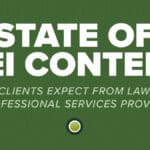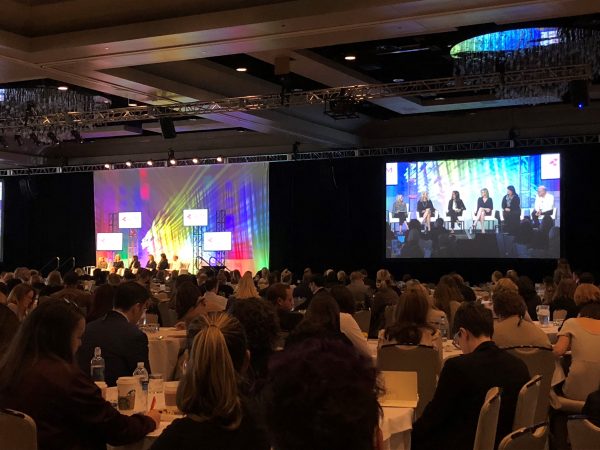February 8, 2024
Navigating DEI Backlash: Communicating on diversity, equity and inclusion in a post-affirmative action world

How should professional services organizations talk about DEI at a time when even the acronym itself has become a lightning rod for controversy?
DEI programs in business and academia have been under the magnifying glass since the Supreme Court struck down race-conscious admissions at Harvard and the University of North Carolina last year. The watershed ruling emboldened DEI critics who equate efforts to increase racial diversity in the workplace with reverse discrimination.
Now the backlash is dominating headlines as corporate leaders backpedal recent commitments and DEI becomes a culture-war football in a contentious U.S. election year. It is a striking reversal of the climate just a few years ago, when George Floyd’s murder and nationwide protests over racial injustice unleashed a flood of diversity-related statements and pledges from corporate America.
This moment presents a two-fold challenge for leaders. It complicates efforts to advance diversity, equity and inclusion at their own organizations—an issue that many legal and professional services firms have struggled with for decades, particularly when it comes to representation among upper management and executive ranks. It also has ramifications for firms’ service offerings and counsel to clients on DEI-related issues, including those tied to ESG, a growing business area for legal, accounting and consulting firms.
In what follows, we’ll discuss how professional services firms can communicate effectively, and authentically, to stakeholders about DEI. Those audiences include current and future talent, as well as clients and potential clients—who may well be wrestling with similar questions themselves.
The current DEI landscape
As companies and law firms scale back DEI initiatives or quietly retool them to avoid mounting legal challenges, it’s worth considering the broader impact of the Supreme Court’s decisions on affirmative action.
From a recruitment perspective, some experts expect it to reduce the pool of diverse talent from law schools and universities, based on what’s happened in California and Michigan after state universities there eliminated affirmative action. The broader pushback could also impact corporate DEI initiatives, such as diversity fellowships for historically underrepresented groups.
While the anti-DEI movement may pose heightened risk, companies and boards should understand how current laws apply to DEI measures at their organizations before deciding to shift course. Retreating from earlier commitments could also have consequences, from impacts on talent recruitment and retention to reputational harm.
Here’s how Nell Haslett-Brousse, director of diversity, equity and inclusion at consulting firm Point B, put it in a LinkedIn post soon after the Supreme Court rejected affirmative action in college admissions last June:
“Values have been and should continue to serve as a company’s north star… In a landscape where performative DEI+J [diversity, equity, inclusion and justice] has already drawn sharp criticism, any company that’s pulling away from its bold statements or goals will be hard-pressed to find near-term benefit, let alone long-term gains from reacting so quickly.”
Understand your DEI motivations
Caution is understandable. But there’s not much to be gained from walking back a previous commitment to DEI—you risk appearing disingenuous, or worse. As my colleague Steve DiMattia has noted, in moments like these it’s important to “draw on well-defined organizational values—what you stand for, and how you demonstrate and encourage behavior that lives up to it.”
Organizations navigating this increasingly polarized environment must reflect on why they are pursuing their DEI path. Have those drivers or goals changed? How might the more fraught political and legal environment affect your firm’s chosen approach?
After all, many see DEI both as a social issue and a business imperative, and firms have a right to decide for themselves what steps to take to ensure the long-term success of their businesses. It’s important to consider what those efforts signify to critical constituencies, such as clients and current or potential talent.
“Diversity is the most important issue facing the accounting profession because it is essential for its sustainability and success in the global economy,” Anoop Natwar Mehta, immediate past chairman, AICPA & Association of International Certified Professional Accountants, told Accounting Today. “I also believe increasing diversity will also help our pipeline challenges.”
Clients are hungry for DEI counsel, too. Greentarget and Zeughauser Group’s State of DEI Content Report (released six months before the Supreme Court’s rulings on affirmative action) found that executive decision makers want more guidance on DEI from the law, accounting and consulting firms they hire, with 69% of law firm chief marketing officers ranking DEI as the topic that attracts the most attention from clients.
As a result, organizations are unveiling service offerings directly related to DEI counsel. For example, some law firms are launching DEI-focused practice groups to help field the recent flood of queries about racial equity audits and legal challenges.
But it goes deeper. Our research also shows that executive decision makers want their service providers to make progress as well as provide counsel on inclusion and diversity—and in-house counsel rate their law firms’ DEI execution as mediocre, saying there’s more work to be done. That’s something to keep in mind when considering adjustments to DEI programs and communications.
Be transparent about what—and how—you’re doing when it comes to DEI
Diversity, equity and inclusion is a long game. Reactive pivots and retreats can signal a lack of authentic commitment that could do more damage over time, both reputationally and to your DEI goals, than staying the course. Consistency and communication matter.
Think about your audience—especially when it comes to talent. As Bloomberg reported in September: “While most baby-boomers don’t consider a company’s focus on DEI when applying to jobs and accepting offers, almost three-quarters of Gen Z workers want their employer to consider it a priority, according to a new global study by consultancy Ernst & Young LLP.”
Track your efforts and share where you are and what needs improvement. As Point B’s recent research on DEI+J maturity shows, “While companies have invested heavily in top-down initiatives like workforce development and recruitment, many have yet to implement the deeper, structural changes and policies needed to make a lasting impact.” Consider what metrics may be most effective to assess progress—and which ones could expose your firm to risk in the current environment. Tying DEI programs to specific business outcomes may be a safer bet than setting quotas or diversity targets, for example.
For its part, the New York State Bar Association’s Task Force on Advancing Diversity advises private employers—corporations and law firms—to communicate a continued commitment to the organization’s DEI principles, but also to evaluate how employees and external stakeholders perceive those efforts and programs. What’s more, the group recommends keeping a close eye on DEI-related communications and disclosures and ensuring that people making employment decisions understand the key legal principles that govern DEI programs.
But it’s important to note that, as DEI and corporate governance lawyers told Fortune recently, despite the headline-grabbing lawsuits alleging reverse racism, firms are more likely to be sued by employees or job seekers from historically underrepresented groups.
DEI is here to stay
Despite the well-documented blowback, most organizations remain committed to DEI. According to new research from employment law firm Littler, 57% of the more than 300 C-suite executives surveyed say their companies have expanded diversity-related initiatives over the past year. And while nearly six in 10 (59%) say anti-DEI backlash has increased since the Supreme Court rulings, three-quarters of respondents say the decisions haven’t changed their approach. Of the 6% who did scale back DEI efforts, concerns around general legal liability and costs were the primary factors.
“We’re seeing many employers maintain—or even double down on—their commitment,” said Jeanine Conley Daves, Littler shareholder and member of the firm’s IE&D [inclusion, equity and diversity] Consulting Practice. “Demonstrating that IE&D is part of their core values, many organizations are taking the prudent step of auditing and assessing their current initiatives, rather than eliminating them amid the challenges in today’s political and legal environment.”
The stakes are high, and the challenges are real. If you’re looking to start a smarter DEI-focused conversation in a post-affirmative action world, the team at Greentarget is here to help.
About the Executive Positioning Practice
Exemplifying Greentarget’s commitment to being a trusted advisor to clients, our Executive Positioning team provides C-suite executives (managing partners, CEOs, executive committees, and boards) with insights to anticipate, understand and respond to important global and social developments, analyzing key issues that can impact reputation and compel leaders to communicate.









